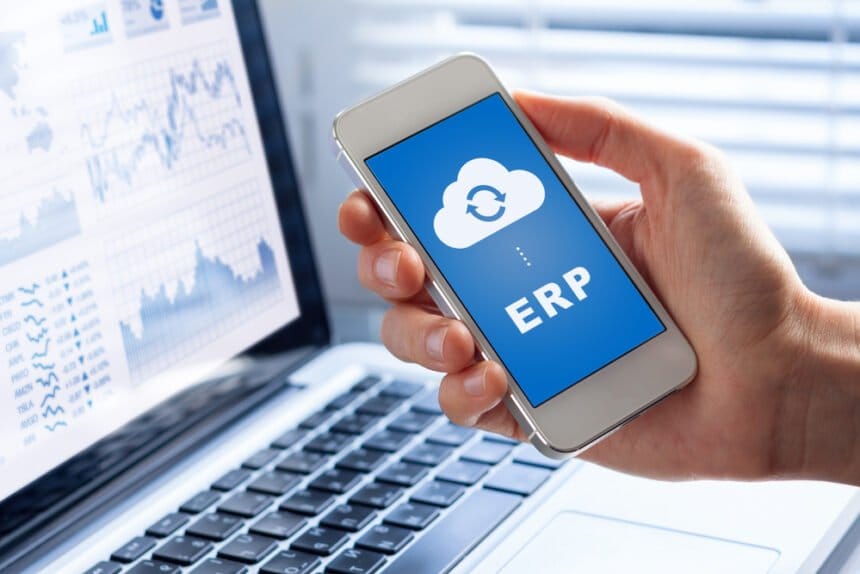AI technology has become crucial for modern businesses trying to maintain a competitive edge in the 21st Century. Around 35% of businesses are already using AI and another 42% plan to use it in the future. The rapid proliferation of ChatGPT has gained a lot of attention over the last few months, but it is not the only form of AI software impacting business.
Businesses are also using AI-driven ERP software. This software is a gamechanger for large businesses trying to bolster efficiency.
AI-Driven ERP Tools Are Becoming More Important than Ever
AI tools are becoming more common in enterprise software. This post discusses the types of AI tools, how they are used in ERP systems to improve business processes, and the challenges of finding a supplier that offers what you need.
ERP systems have been stagnant for decades in managing and processing enterprise data. People input data into the system and move it along to support business operations. Using ERP software that utilizes AI technology will change this process. People will no longer need to code every detail of a transaction or wait to approve reports. Reports will no longer need to be manually analyzed for business insights.
Whether business leaders are looking into new technologies to improve efficiency or they’re already familiar with enterprise resource planning (ERP) software but feel that it’s time to find a new vendor, the choice of which company to trust is difficult to make. There are hundreds of products available, each with different advantages, drawbacks, and price points.
They will want to look for an ERP vendor that has used AI technology to improve the quality of its products. AI has a number of benefits for ERP software:
- AI technology can improve how ERP software handles and analyzes data. It can analyze larger data sets than ever before, leading to better real-time and accurate data insights. With AI, enterprises can analyze the purchasing behavior of different client categories and tailor their inventories to their needs. This is especially important for manufacturers.
- AI also helps with automation. AI technology can improve the performance of an ERP through process automation. The AI can learn and make intelligent decisions, simplifying tasks like accounting and payroll administration. When integrated with an ERP system, AI can identify inefficient processes and suggest cost-cutting solutions. Predictive diagnostics are also possible with AI, reducing resource waste.
- AI technology integrated into an ERP system can also be beneficial for UX optimization. It can learn from users and simplify the software, similar to how it improves smartphone usage. AI technology can also enhance the user experience by facilitating interaction with complex systems like ERPs.
Once you understand the importance of making sure an ERP solution uses AI, it is important to find a vendor that offers the solutions that you are looking for. Simply separating the wheat from the chaff is hard enough, but even among the top-performing ERP systems there will still be key differences to consider. When choosing an ERP, business leaders should be sure to take the criteria described in this article into account.
1. Business Requirements and Functional Fit
Some ERP systems are highly generalized and can be used by companies in almost any industry. This SAP ERP and Infor M3 comparison provides a good example. By comparing SAP ERP, a software suite that is suitable for just about any large business with Infor M3, which is much more specialized, the report makes it clear whether a generalized ERP will be sufficient for many businesses.
2. Key Features
Starting by determining industry and specific company requirements makes it easier to evaluate each ERP system’s key features. However, there are some modules that every business needs. Business intelligence, data analysis, and information security are important in all industries. Similarly, every company can benefit from an ERP with simple UI and UX design and easy-to-access end-user reporting tools.
3. Total Cost of Ownership
The cost of ownership for ERP systems varies based on the deployment model, as does the return on investment (ROI) that can be expected from them. On-premises ERPs require businesses to pay up-front for the hardware and software required to run the system. Companies will also be responsible for paying to implement, customize, upgrade, and support the system and keep it secure. Cloud-based ERPs have a much lower cost of ownership and tend to provide a better return on investment.
4. Initial Scope and Scalability
Mid-sized enterprise-level businesses shouldn’t have to pay for features that are tailored exclusively to the needs of their much larger peers. However, opting for an ERP with limited functionality and scope can also come at a price, as scaling up the business will mean going through the entire process of choosing an ERP vendor all over again. The ideal solution is one that can be scaled up with the business as it expands to new markets or adopts additional technologies.
5. Vendor Reputation
Business leaders should only consider ERP solutions from vendors that have been in business for long enough to have developed a positive reputation. They should expect to be working with the company during the initial deployment phase and for upgrades, updates, and expansions. A vendor that has a reputation for inadequate customer service or one that simply hasn’t been around long enough to guarantee it will be there to help when the business is ready to scale up won’t cut it. Choose a well-established, reputable provider.
Don’t Be Afraid to Ask for Help when Choosing an AI-Driven ERP
AI technology has made ERPs more effective than ever. However, it can difficult to choose the right one. There are a lot of ERP solutions available, even if they don’t all use AI technology. Unfortunately, not all companies’ business and IT leaders have the hours of extra time required to compare every vendor. If that’s the case, the most practical and cost-effective solution is to work with a business software consultant, so don’t be afraid to ask for help.











